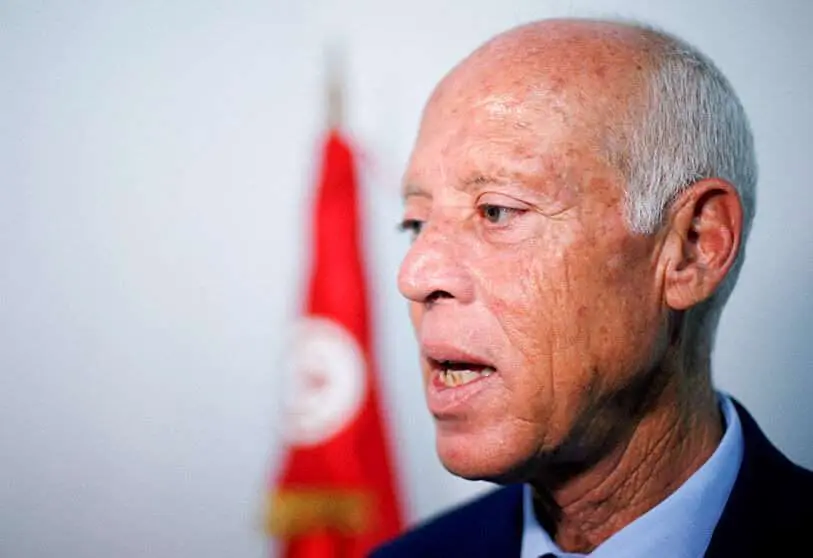Kaiser Kais Saied

Kaiser Kais Saied (KKS), president of Tunisia, awakened us, like William II, the last German emperor (Deutscher Kaiser), with disturbing totalitarian overtones with his now consummated coup d'état.
The KKS had invested heavily in promoting himself through grandiloquent and controversial speeches, based on the rhetorical language and the oratory of dictators of former times, brandishing a threatening index finger at his opponents.
The so-called 'Jasmine Revolution' put an end to decades of dictatorship in Tunisia to begin its democratic transition in 2011. Several failed governments would further aggravate the country's political, economic and social crisis. This provoked the anger of Tunisians to opt for the populist KKS, which promised more than paradise.
KKS came to the candidacy with a Hitleresque lip service, setting himself up as a challenger to any hint of democracy. His high-handed speeches, much discussed in the press, aroused controversy because of his lack of respect for his opponents and his defiance of all opposing views.
By winning the presidential elections in the second round against Nabil Karoui, KKS became the first elected independent to become President of the Republic. Then, on 25 July 2021, he staged his coup d'état by suspending parliament and dismissing the head of government, Hichem Mechichi. And when the judiciary rebelled against him, he dismissed more than 60 judges, accusing them, without any evidence, of corruption and collusion with terrorism.
This was the beginning of an unbridled drift towards totalitarianism in the midst of an alarming political, economic and social crisis. He banned politicians from travelling, detained prominent figures, shut down opposition media and social networks, and dismantled several organisations that opposed the president's measures.
The new constitution was later approved, voted for by only 27% of the electorate, following the opposition's call for a boycott. This shows how little support the dictator had for a constitutional text tailored to his own needs, dismantling the spirit of the Arab Spring and thus Tunisia's fledgling democracy. A constitution that has only served to deepen the country's division and delegitimise the tyrant's power.
Even before the constitutional referendum, angry demonstrations erupted across the country, resulting in mass arrests. Suspicions of an autocratic, presidential-style constitution that gave the president sweeping powers and absolute control over the new "republic of Kaiser Kaiser Saied" were confirmed. This power is mainly based on the decree-laws proposed to parliament by this autocrat. An EU report concluded that the KKS's drifts were deeply damaging to the small North African country.
Tunisia has been turning to the IMF for many years to resolve its economic and financial difficulties. And the dictator has once again urgently requested refinancing to prevent the country from collapsing. Otherwise, Tunisia's international reserves would collapse. And the outlook is for further depreciation of the Tunisian dinar, increased repayments and higher sovereign debt burdens. The reforms proposed by the IMF to clean up Tunisia's economy could take their toll on already impoverished citizens, as well as threatening social peace and political stability.
This chaotic scenario was used by the Algerian military junta to further increase tension in the region. Algeria had threatened to cut off gas to Tunisia's electricity grid and to maintain border closures. The latter prevented mostly Tunisian trade.
Pressure dissolved into promises, which the puppet president, Tebboune, proposed to the KKS, as well as 150 million dollars in deposits in the Tunisian Central Bank (BCT).
Thus, the KKS, in desperation, saw the price of gas, on which Tunisia is absolutely dependent for its electricity grid, rise. He also saw the wallet of an Algeria that is lining itself with windfall profits. He also saw how much the Algerian military junta is suffering in reviving the dying Polisario terrorist group.
Algeria's military-political power, in its process of self-destruction, is always ready to surrender itself to the highest bidder. Moreover, now that its coffers are full, it is going to empty them, once again, to buy the will of its suffering population.
Of course, under these conditions, the KKS is yet another euthanasia injection in the backside of an Algeria that has been in suicide mode for years. Faced with this weakness, the Tunisian tyrant has not hesitated to take advantage of it by welcoming the terrorist Ghali, president of an imaginary republic.
Today, the KKS is "in the clear", because the other side has already cashed its cheques. He will end up rich and the Tunisians impoverished. A people much loved by the Moroccans. What's more, the KKS has just betrayed them.
This tyrant had no reason to antagonise Morocco, but he was very eager for the limelight. His self-interested change of position is nothing more than bread for today and hunger for tomorrow. It is a delicate decision that breaks the policy of balance between neighbours. And aligning with Algeria against Morocco is not only diplomatic stupidity, but also political suicide.
Is the Tunisian country in such a bad state that the KKS would accept this infamous barter? What is clear is that totalitarianisms attract each other and Tunisia's tyrant will end up embracing the Russian camp (Cuba, Venezuela, Algeria and Iran). In fact, he keeps shunning and rudely answering the international community's warnings to return to the fold of democracy.
The KKS is making Tunisia its own showcase, exposing it to isolation and great political, economic and social hardship. Indeed, his self-centredness distances him from the country's real project and irremediably precipitates his downfall.
Unlike William II, who fell victim to his charlatanism, the KKS will be defeated by the inertia of his own actions.

